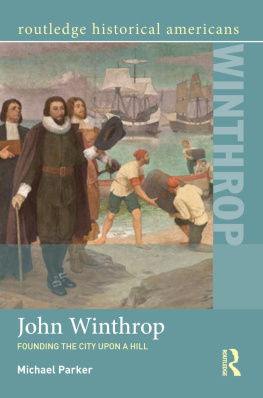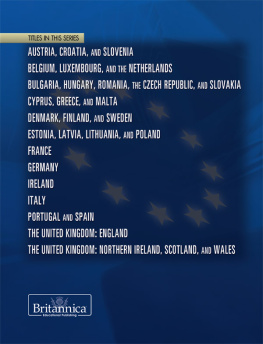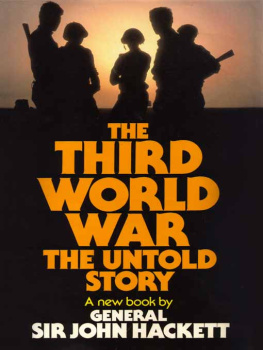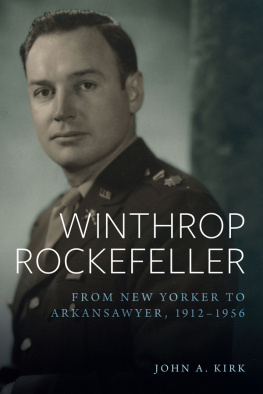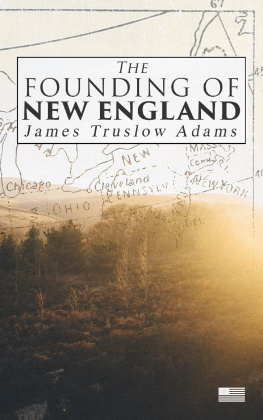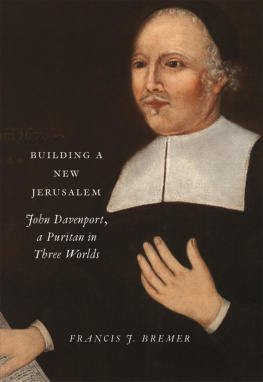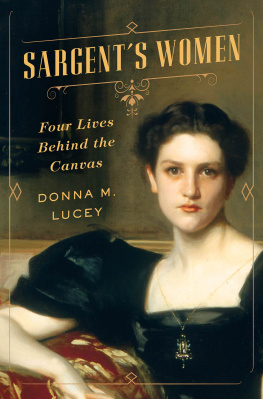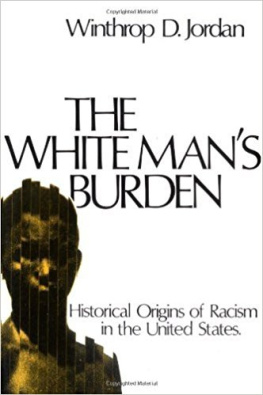John Winthrop
John Winthrop
Americas Forgotten Founding Father

FRANCIS J. BREMER


Oxford New York
Auckland Bangkok Buenos Aires Cape Town Chennai
Dar es Salaam Delhi Hong Kong Istanbul Karachi Kolkata
Kuala Lumpur Madrid Melbourne Mexico City Mumbai Nairobi
So Paulo Shanghai Singapore Taipei Tokyo Toronto
Copyright 2003 by Oxford University Press, Inc.
Published by Oxford University Press, Inc.
198 Madison Avenue, New York, New York 10016
www.oup.com
Oxford is a registered trademark of Oxford University Press
All rights reserved. No part of this publication may be reproduced,
stored in a retrieval system, or transmitted, in any form or by any means,
electronic, mechanical, photocopying, recording, or otherwise, without
the prior permission of Oxford University Press.
Library of Congress Cataloging-in-Publication Data
Bremer, Francis J.
John Winthrop: Americas forgotten founding father/
Francis J. Bremer.
p. cm.
Includes bibliographical references and index.
ISBN 0-19-514913-0
1. Winthrop, John, 15881649. 2. GovernorsMassachusettsBiography.
3. PuritansMassachusettsBiography.
4. MassachusettsHistoryColonial period, ca. 16001775.
5. PuritansMassachusettsHistory17th century.
6. Great BritainHistoryTudors, 14851603.
7. Great BritainHistoryEarly Stuarts, 16031649.
8. EnglandChurch history16th century.
9. EnglandChurch history17th century.
I. Title
F67.W79 B74 2003 974.402092dc21 2002038143
1 3 5 7 9 8 6 4 2
Printed in the United States of America
on acid-free paper
for Bobbi
as John to Margaret,
My only beloved spouse, my most sweet friend,
and faithful companion of my pilgrimage
Contents
Part One
Heritage
Part Two
Struggle
Interlude
Christian Charity
Part Three
Errand
Acknowledgments and Thanks
OVER THE YEARS I have come to feel a strong connection between the stories of the past and places of the past, so it seemed natural to seek out the English places where the Winthrops had lived, attended school, served on the commission, and raised their families. I was fortunate to meet and befriend Martin and Jane Wood. Living a few hundred yards from St. Bartholomews Church in Groton, Martin is himself an avid student of the early modern history of the parish and the region. Our families became friends, and over the past decade it has been a rare visit to England that did not find me spending time as a guest of the Woods. Together Martin and I explored towns, churches, and graveyards, walked the fields to gain an idea of the bounds of Winthrops manor, and peered at microfilm in the record offices at Bury and Ipswich. Through the Woods I came to know and appreciate other members of the Boxford and Groton communities. Edgar and Jean Elliott once lived in what had been the Winthrop mansion house, where Edgar had himself been raised. During a massive rehabilitation preparatory to its division into three separate households, they took extensive photographs, which reveal the structure and decorations of the Tudor building. Their loan of those pictures proved invaluable in establishing Groton Place as the mansion house and in understanding its layout. Ron Partridge and his wife, Gladys, lived in Groton Hall, the original hall of the pre-Reformation manor, which came to house Winthrops as well in the late sixteenth and early seventeenth centuries. Their generosity in showing me the Hall and discussing its evolution likewise proved of great use. These and other residents of Groton, such as Mary Every, encouraged my work and shared generously of themselves. I was entered on the parish rolls as a nonresident member and allowed to read lessons during worshipa privilege I much value. John Taylor of nearby Newton discussed with me farming in Groton in Winthrops times and today. In nearby Boxford, Jenny Robinson, a dedicated local historian of that community, was equally unstinting in her support and encouragement, allowing me to see and use some of the products of her own research and inviting my wife and me to relax in the splendors of the garden behind the Tudor coach house, across from St. Marys church, that is her home.
IN A MORE traditional vein I have also profited from numerous scholars on both sides of the Atlantic. My greatest debts are perhaps to those who helped me to find my way through the thickets of English history, religion, and law. There was no Tudor-Stuart historian at Columbia University when I did my graduate work there, so my education in the field has come from reading books and asking questions. Among the many English-based scholars who patiently responded were Simon Adams, Ian Archer, J. H. Baker, Michael Braddick, Susan Brigden, Nicholas Canny, John Coffey, John Craig, Pauline Croft, Colin Davis, David Dymond, Lori Anne Ferrell, Ken Fincham, Frank Grace, Steve Gunn, Susan Hardman-Moore, Simon Healey, Steve Hindle, Ralph Houlbrooke, Judith Maltby, Peter Northeast, Jane Ohlmeyer, Glynn Parry, Andrew Petteggree, Wilfred Prest, Michael Questier, Steven Rappaport, John Schofield, Roger Thomson, Nicholas Tyacke, Susan Wabuda, Tim Wales, and John Walter. In this country I have benefited from the advice of Bob Anderson, Sarge Bush, Charles Cohen, Richard Dunn, David H. Fischer, Stephen Foster, Chris Fritsch, Richard Gildrie, David Hall, Stephen Innes, Rolf Loeber, Robert Middlekauff, Carol Miller, Mark Peterson, Richard Rath, and Hal Worthly.
At Millersville University I have benefited from the collegial atmosphere and the support of faculty colleagues, administrators, and students. Among those I would especially like to thank are Dennis Downey, John Osborne, Linda Clark-Newman, Jack Fischel, John Thornton, Chris Dahl, Susan Ortmann, Monica Spiese, John MacDonald, Richard Rath, Glen McCaskey, Jill Kress, and Terry Sales. The Faculty Grants Committee of Millersville University has been generous in supporting my research trips.
Other debts are more specific. Sue Sadler conducted the original research into John Winthrops tenure on the Commission of the Peace. Tom Freeman showed me the Emmanuel College manuscripts relating to William Winthrop and assisted me on numerous occasions as I labored to identify Winthrop connections to the early English Reformation. Brett Usher pointed me to the Exchequers composition books for first fruits, sharing with me his own findings in that treasure trove and saving me from errors on many occasions. Christopher Thompson not only shared with me his insights into the Forth family and their connections with the Riches but chauffered me around southeast Essex to examine Great Stambridge and the other places of Winthrop interest in that area. I have learned much from Tom Webster, who is one of the most brilliant of the younger generation of puritan scholars. At a National Endowment for the Humanities seminar in 1975 Tim Breen helped me to understand the broader cultural forces that are a key to understanding the past, and he has since been a valued friend and source of encouragement.
It is always a blessing when academic contacts lead to personal friendship, and I have been fortunate in this many times over. I still remember the wonderful humanity of Christopher Hill, holding the hands of my young daughters Heather and Kristin and skipping along the streets of Cincinnati, Ohio, in 1975. Christopher was there to speak at a conference I had organized at Thomas More College, Puritanism in Old and New England; we had corresponded, but it was the first time we had met. Though his advice was of more direct relevance to
Next page

